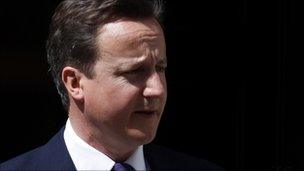Cameron plays down cabinet rift over non-EU migrant cap
- Published

Mr Cameron wants to give more attention to Anglo-Indian relations
David Cameron is attempting to play down cabinet divisions over immigration after Business Secretary Vince Cable said a planned cap on numbers coming from outside the EU must be flexible.
The prime minister told the BBC it was "perfectly legitimate" for Mr Cable to argue his case.
But, he added, "we decide these things in a cabinet, in a reasonable and sensible way".
The cap is due to come into force in April following a consultation.
Mr Cameron, who is on a trade mission to India with other senior ministers, including Mr Cable, has said he wants to cut net immigration to levels last seen in the 1990s - which he claimed would kill it off as an issue in British politics.
'Flexible arrangement'
He told BBC Radio 4's Today programme: "I want to see, and the government wants to see, the level of net immigration into the UK come down to the tens of thousands, rather than the hundreds of thousands it's been in recent years."
He added: "I think we need to control immigration more effectively in Britain. I do want a cap.
"We have signed the coalition agreement which is very frank about controlling immigration and the need for an immigration cap. That's what the coalition agreement says and Vince Cable was talking about that this morning.
"This government is taking government off the sofa and putting it round the cabinet table.
"It is perfectly legitimate for the business secretary to argue for the advantages of free and open markets and that is what Vince does. But we decide these things in the cabinet in a reasonable and sensible way."
The promise to cut the overall levels of immigration by putting a limit on the numbers of people allowed into the UK from outside the EU was a central promise in the Conservative manifesto, and part of the coalition agreement with the Liberal Democrats.
But the Lib Dems, including Mr Cable, argued strongly against it during the general election campaign.
'Talented students'
Mr Cable, who is in Bangalore with Mr Cameron, told the BBC he was not opposed to a cap, but added: "The key point is that it's got to be flexible. Companies expect to be able to move their staff around simply to do their job and it's my job as business secretary to make that case."
He would not confirm that the cap would see a drop in the numbers coming from India.
He denied that there was a "fundamental difference" in the cabinet on the issue but said he would continue with his role, "putting strongly that we need to have a flexible arrangement".
He said the coalition agreement was "set in stone... but I have a job to do".
Mr Cameron has also faced criticism from the Indian government over the planned cap, with commerce minister Anand Sharma saying it could have an adverse effect on trade relations between the UK and India and hit Indian doctors, nurses and engineers seeking employment in the UK.
Mr Cameron said the Indian government was among the bodies being consulted about the level at which the cap should be set.
And he stressed that the UK wanted "talented Chinese and Indian students" to come and study in the UK but he wanted a crackdown on "bogus students and bogus colleges".
He refused to be drawn on the likely level of the cap, urging people to wait for the outcome of the consultation in September, telling Today: "Everyone is free - the Indian government and businesses included - to make their arguments about how high the cap should be."
Lib Dem deputy leader Simon Hughes also rejected talk of a rift at the heart of the coalition over immigration, saying the media was trying "a bit over-hard to find differences, where the differences ar minimal or non-existent".
He told the BBC News channel: "It's part of the coalition agreement that there will be a cap on immigration, but we agreed that how it works has got to be worked out and it's got to be flexible."
Last month the UK government introduced a temporary limit on the number of migrant workers from outside the EU allowed into the UK.
The aim was to prevent a rush of applications before a permanent cap is set next April.
BBC economics editor Stephanie Flanders, who is travelling with the prime minister's trade delegation, said "their plan to cap the number of immigrants to the UK from countries like India isn't going down well here at all".
- Published28 July 2010
- Published28 July 2010
- Published27 July 2010
- Published27 July 2010